When it comes to modern kitchen countertop materials, the choices are vast, each offering its unique blend of style, durability, and maintenance. Selecting the right countertop is one of the most important decisions you’ll make in your kitchen design or remodel. It’s not just about looks; countertops have to withstand heat, moisture, stains, and constant use, while still maintaining their appeal over time. There are numerous materials available today, from natural stones to engineered surfaces, each with its own set of characteristics that may or may not align with your kitchen’s needs. I’ve found that the best way to choose a countertop is to think about how you use your kitchen daily and match the material to your lifestyle.
Quartz is undoubtedly one of the most popular choices for modern kitchen countertops. It’s an engineered stone, composed of about 90-95% ground quartz and resins. One of the biggest advantages of quartz is its durability. It’s non-porous, meaning it won’t absorb liquids, and is highly resistant to staining, which is a huge plus in a kitchen where spills are inevitable. I love quartz because it’s virtually maintenance-free. Unlike natural stones, quartz doesn’t need to be sealed, making it perfect for busy households. Additionally, quartz comes in a variety of colors and patterns, some of which mimic the look of natural stones like marble or granite. This versatility allows you to get the aesthetic appeal of stone without the added maintenance.

Granite remains a classic choice for kitchen countertops, and for good reason. It’s a natural stone that offers incredible strength and heat resistance, which is important in a kitchen where hot pans or pots often land on the surface. Each slab of granite is unique, with its pattern of veins, speckles, and swirls, giving it a one-of-a-kind appeal. The natural beauty of granite can make any kitchen feel more luxurious and refined. However, granite is a porous stone, meaning it does require periodic sealing to protect it from stains and moisture. I’ve found that granite holds up well in high-traffic kitchens, but it does demand a bit more care than engineered materials like quartz.
Marble is another natural stone that has long been associated with luxury and sophistication. Its soft veining and smooth surface make it a showstopper in any kitchen. However, marble is softer and more porous than granite or quartz, which makes it more prone to scratching, staining, and etching, especially from acidic substances like lemon juice or tomato sauce. While I love the look of marble, it’s a higher-maintenance material, and I’d only recommend it if you’re willing to be diligent about upkeep. Sealing the marble helps, but you still have to be cautious with it. That said, the timeless beauty of marble is hard to beat, and it can elevate the overall aesthetic of a kitchen.
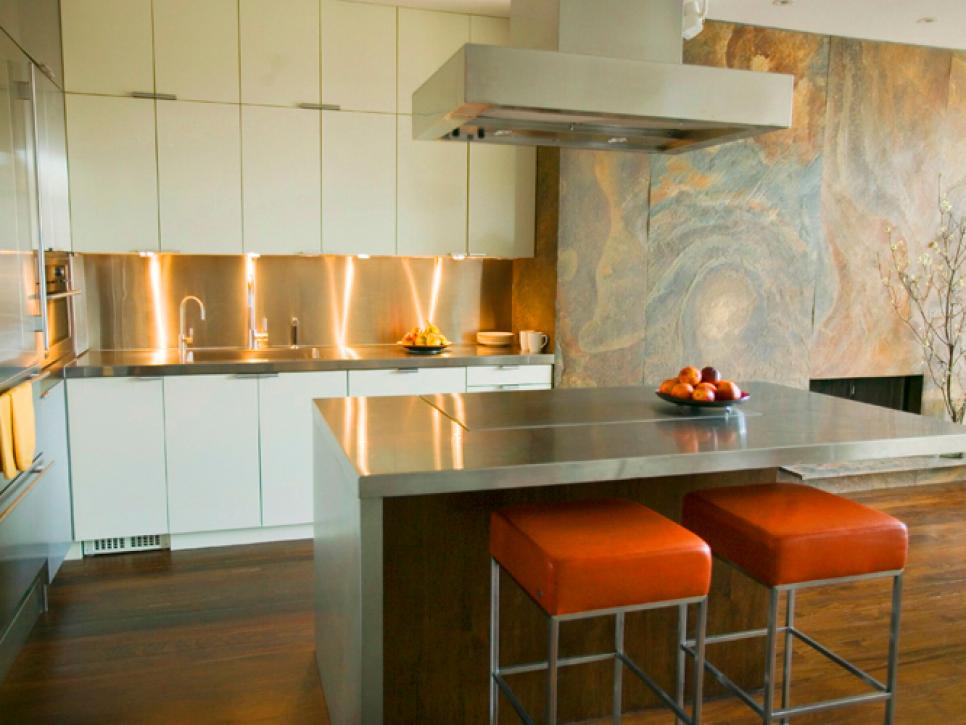
For a more industrial or minimalist look, concrete countertops have gained popularity in modern kitchens. Concrete is incredibly versatile because it can be custom-poured to fit any space, and you can choose from a wide range of finishes and colors. It can be left raw for a rugged look or polished for a sleek, modern finish. One of the great things about concrete is that it can be combined with other materials like glass or stone to create unique textures and designs. However, concrete is a porous material, so it needs to be sealed regularly to prevent stains and cracks. Despite the extra care required, I’ve always found concrete countertops to be a great way to make a bold design statement in a modern kitchen.
Solid surface countertops, such as Corian, are another great option for modern kitchens. These countertops are made from a blend of acrylic and natural materials, and they offer a seamless, non-porous surface that’s resistant to stains, bacteria, and moisture. What I love most about solid surface countertops is their ability to be molded into various shapes, allowing for integrated sinks or backsplash areas without seams or grout lines. This creates a very clean, modern look. Plus, if the countertop does get scratched, it can be sanded and repaired relatively easily. Solid surface materials come in a variety of colors and patterns, some even mimicking the look of stone, offering both style and practicality.
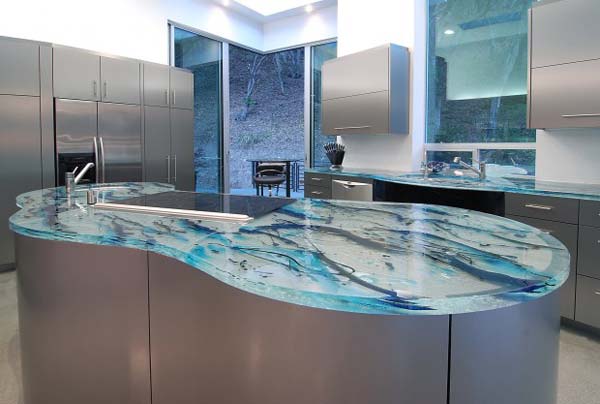
Butcher block countertops offer a warm, natural feel to modern kitchens. Made from thick pieces of wood, typically hardwoods like maple, oak, or walnut, butcher block adds a rustic yet refined element to any space. I love how the natural wood grain can complement a variety of kitchen styles, from modern to farmhouse. However, wood is a softer material and can scratch, dent, or even warp if not properly cared for. Butcher block countertops need regular oiling to protect the wood and maintain its beauty. While they do require more upkeep than other countertop materials, their warm, organic look can’t be replicated by stone or man-made surfaces.
Stainless steel countertops are another option for those seeking a sleek, modern look. Commonly used in professional kitchens, stainless steel is incredibly durable, heat-resistant, and easy to clean. It’s non-porous, so it won’t harbor bacteria or stains, making it an excellent choice for cooking enthusiasts who prioritize cleanliness. The reflective surface of stainless steel can make a kitchen feel larger and brighter, especially in smaller spaces. However, stainless steel does tend to show fingerprints and scratches more easily than other materials, so it requires regular wiping to keep it looking pristine. In my experience, stainless steel is best suited for modern or industrial-style kitchens.
Porcelain countertops are a newer trend in kitchen design, and they’re gaining popularity for good reason. Porcelain is highly durable, heat-resistant, and non-porous, making it ideal for kitchen countertops. It’s made from a dense, high-fired ceramic that can be printed to mimic the look of natural stone, wood, or even concrete. I’m impressed by how far porcelain has come in recent years—it offers the beauty of stone without the maintenance. Because it’s non-porous, porcelain won’t stain or absorb liquids, and it’s also resistant to scratches and heat. This makes it a fantastic option for anyone looking for a low-maintenance, durable countertop that still looks modern and sophisticated.

Recycled materials, such as recycled glass or paper composite countertops, are gaining traction among environmentally-conscious homeowners. Recycled glass countertops are made from pieces of glass embedded in a concrete or resin base, creating a colorful, mosaic-like appearance. These countertops are incredibly durable and non-porous, making them a practical choice for modern kitchens. Paper composite countertops are made from recycled paper and resin, and they offer a surprisingly durable and eco-friendly alternative to traditional countertops. I love the sustainability aspect of these materials, and they offer a unique, modern look that’s perfect for those who want something different.
Laminate countertops have come a long way since their inception, and modern laminates offer a wide range of colors, patterns, and textures that can mimic the look of more expensive materials like wood or stone. Laminate is an affordable and easy-to-maintain option for modern kitchens, making it a great choice for those on a budget. One of the biggest advantages of laminate is that it’s non-porous, so it won’t absorb spills or stains. It’s also resistant to scratching and heat to a degree, though not as much as natural stone or quartz. I’ve seen some stunning laminate countertops that rival the look of more expensive materials, making them a smart choice for cost-conscious homeowners.
Soapstone is another natural stone option for modern kitchen countertops. Soapstone has a smooth, matte finish and is typically darker in color, ranging from light grey to deep black. It’s non-porous, which means it’s resistant to stains and bacteria, making it an excellent choice for kitchens. Soapstone also has a unique property in that it develops a natural patina over time, giving it a worn-in, antique look that many people find appealing. While soapstone is softer than granite or quartz and can scratch more easily, these scratches can often be sanded out. I love the rustic, earthy feel that soapstone brings to a kitchen, and it’s a great option for anyone looking for a more understated, natural look.

Terrazzo countertops are making a comeback in modern kitchen design. Terrazzo is made from chips of marble, quartz, granite, or glass embedded in cement or resin. The result is a speckled, colorful surface that can be customized to suit any design aesthetic. Terrazzo is highly durable and resistant to heat and stains, making it a practical choice for kitchens. I’ve always admired the artistic quality of terrazzo—it’s a bold, creative choice that can add a playful touch to a modern kitchen. Plus, it’s eco-friendly since it often incorporates recycled materials, making it a great option for environmentally-conscious homeowners.
Another luxury option for modern kitchens is Dekton. Dekton is an ultra-compact surface made from a blend of quartz, glass, and porcelain. It’s incredibly durable and resistant to heat, stains, and scratches, making it one of the most hard-wearing countertop materials available today. Dekton is also UV-resistant, so it won’t fade over time, even if exposed to direct sunlight. I’ve found that Dekton is perfect for modern kitchens where durability is a priority but aesthetics aren’t sacrificed. It comes in a wide range of colors and finishes, allowing you to achieve the look of stone, concrete, or metal while enjoying the benefits of an engineered surface.
For those seeking an ultra-modern look, glass countertops are an option worth considering. Glass countertops offer a sleek, contemporary aesthetic that can make a kitchen feel more open and airy. They are non-porous, so they won’t stain or absorb liquids, and they’re also heat-resistant, making them practical for kitchen use. One of the things I love about glass countertops is their reflective surface, which can enhance the natural light in a kitchen. However, glass can scratch more easily than other materials, so it’s important to choose tempered glass for added durability. While not as common as quartz or granite, glass countertops are a unique and stylish choice for modern kitchens.
/wood-5717c4d43df78c3fa2442d2a.jpg)
Common Mistakes to Avoid
One of the biggest mistakes people make when choosing a modern kitchen countertop is prioritizing aesthetics over functionality. It’s easy to fall in love with the look of a material like marble, but if you’re not willing to maintain it, it can quickly become more trouble than it’s worth. Another common mistake is not considering the long-term durability of the material. Some materials, like laminate or concrete, may look great initially but may not hold up as well in high-traffic kitchens without proper care. People often overlook the importance of regular maintenance, like sealing natural stone or oiling butcher blocks, which can lead to premature wear and damage.
Another mistake is underestimating the impact of countertop thickness on the overall look and feel of the kitchen. Thin countertops may not offer the same sense of luxury as thicker slabs, and this is something to consider, especially with materials like granite or quartz. Additionally, improper installation is a common issue, particularly with heavy materials like granite or quartz. If not installed correctly, countertops can crack or become uneven over time. Lastly, many people don’t budget for the added costs associated with certain materials, such as sealing or refinishing, which can lead to unexpected expenses down the road.
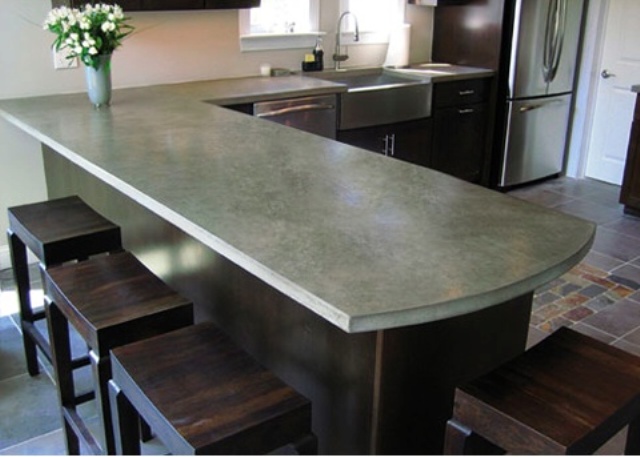
What is the best low-maintenance material for modern kitchen countertops?
Quartz is often considered the best low-maintenance material for kitchen countertops because it’s non-porous, stain-resistant, and doesn’t require sealing. Its durability and variety of color options make it a popular choice for those seeking both style and functionality.
How does concrete compare to natural stone for kitchen countertops?
Concrete offers a more customizable and industrial look compared to natural stone. While natural stone, like granite, is more resistant to scratches and heat, concrete can be molded to fit any space and can incorporate unique textures and colors. However, concrete requires regular sealing to protect against stains and moisture.
Are butcher block countertops practical for modern kitchens?
Butcher block countertops can be practical, especially if you prefer a warm, natural look. However, they do require more maintenance, such as regular oiling to protect the wood from water damage and scratches. They can add a rustic touch but may not be the best choice for those seeking a low-maintenance option.

Can recycled materials be used for durable kitchen countertops?
Yes, recycled materials, such as recycled glass or paper composites, can be both durable and eco-friendly options for modern kitchen countertops. These materials are often highly resistant to stains, heat, and scratches, making them practical for everyday kitchen use.
Is marble a good choice for a modern kitchen countertop?
Marble is a beautiful choice for a modern kitchen, offering a timeless and luxurious look. However, it’s a softer stone that can scratch and stain more easily than other materials. Marble requires regular sealing and careful maintenance to preserve its beauty, so it’s best for those willing to invest time in its upkeep.
Can laminate countertops mimic the look of more expensive materials?
Yes, modern laminate countertops can mimic the look of materials like granite, marble, or wood at a fraction of the cost. Laminate is a budget-friendly option that’s easy to install and maintain, making it a great choice for homeowners who want the look of more expensive materials without the high price tag.

Contemporary Two-Island Kitchen Designs Every Cook Wants to Own Home Design Lover
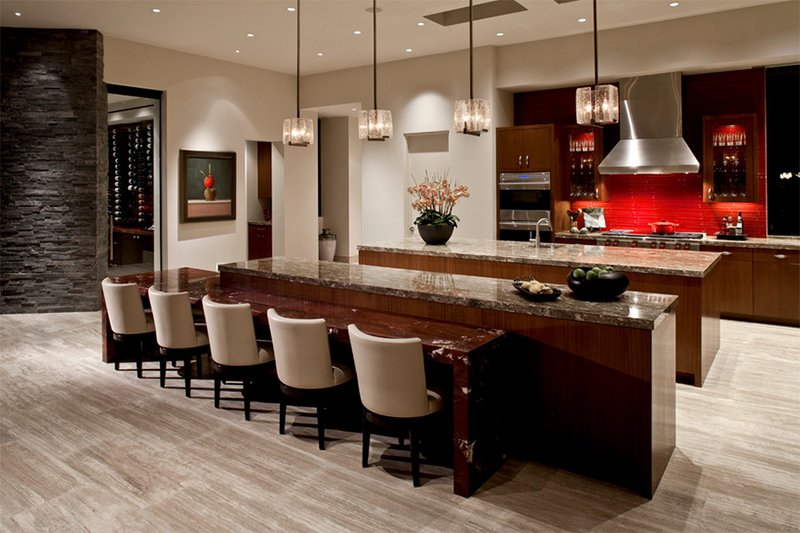
Unique Kitchen Countertops for Your Fancy Kitchen
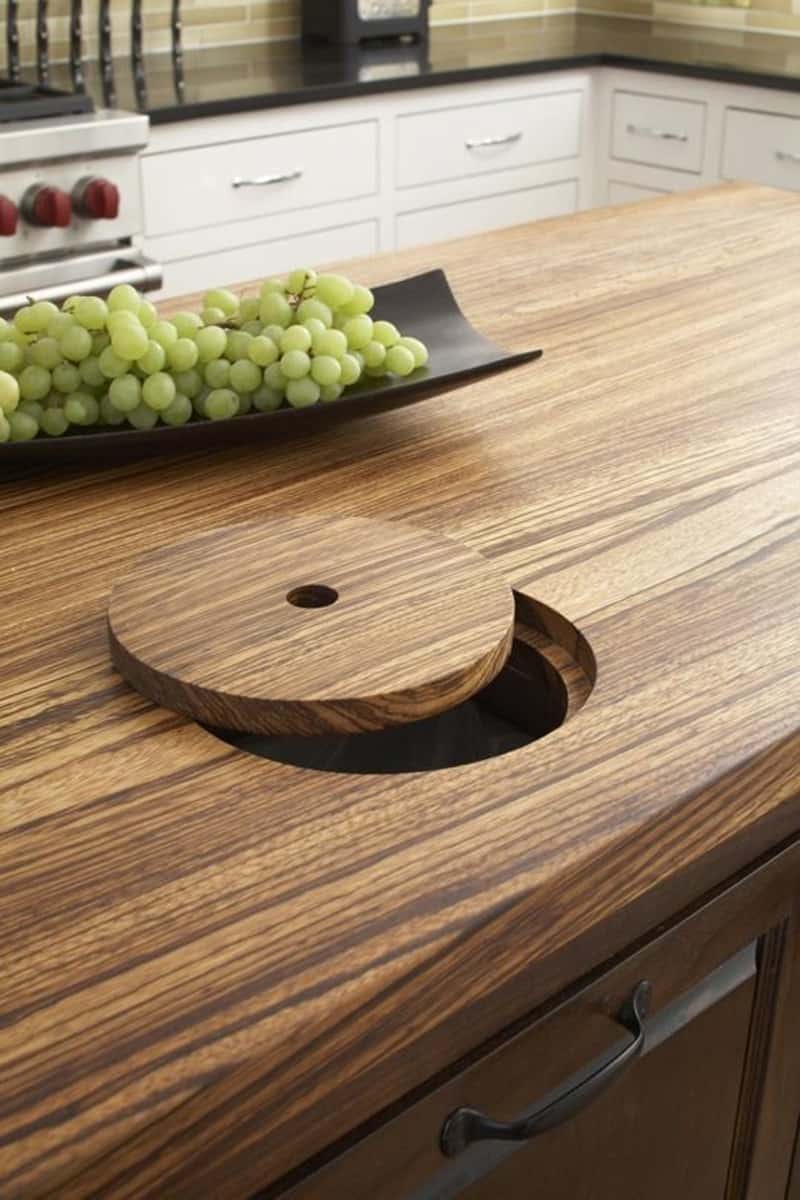
Related Posts:
- Reface Laminate Kitchen Countertops
- White Formica Kitchen Countertops
- Best Way To Clean Kitchen Countertops
- Ceramic Tile Kitchen Countertops Pictures
- Corner Sink Countertop Kitchen
- Antique White Kitchen Cabinets With Black Granite Countertops
- Kitchen Countertop Corner Protectors
- Kitchen Countertops Atlanta
- Light Colored Granite Kitchen Countertops
- DIY Butcher Block Kitchen Countertops